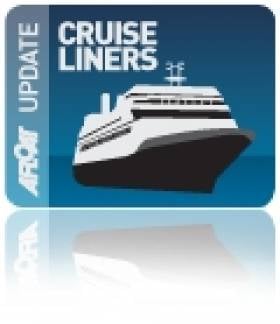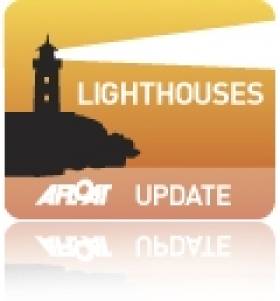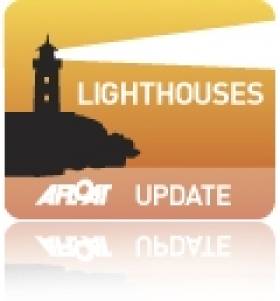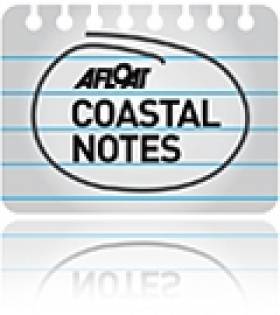Displaying items by tag: lighthouses
Loop Head: A Guiding Light for Foynes-Bound Cruise Calls
Her arrival will be followed by P&O Cruises latest addition Adonia on Saturday. With 710 berths the 30,000 tonnes vessel is the smallest of the seven-strong fleet which can accommodate between 1,800 and up to 3,100 passengers as in the case of the Azura. The 115,000 tonnes vessel departed Dublin Port this evening. Her first call to the port was last year (click HERE) and she is the largest cruise ship to call to the capital.
On Tuesday of next week the 9,000 tonnes Spirit of Adventure (cruises) marks the third cruise caller to Foynes. The port is along with five other terminals located throughout the country's largest estuary are operated by the Shannon Foynes Port Company (SFPC).
Incidentally Spirit of Adventure and Azura where two of another trio of cruise ships that visited the Port of Cork on Monday, with Holland America Line's 59,000 tonnes Rotterdam forming the third vessel. This was the first occasion that Cork has handled this number of cruise ships on a single day, bringing 7,000 passengers which set a new record for the port.
- Shannon Estuary
- Shannon Foynes Port Company
- P&O Cruises
- Loop Head
- Cruiseships
- lighthouses
- Dublin Port news
- Holland America Line
- Port of Cork News
- Le Diamant
- Cruiseliners
- Spirit of Adventure
- Shannon Estuary news
- Loop Head Lighthouse visitor centre
- Azura cruise ship
- Spirit of Adventure cruiseship
- Adonia cruiseship
- Rotterdam cruiseship
- Loop Head Lighthouse
- Shannon Estuary and River
- Shannon Estuary and River news
- Lighthouse news
- Irish cruise calls
- Irish ports of call
- Foynes Port
Hard-Working Vessels Keep Lights Switched-On
Sailing was not the only activity that took place in Dublin Bay last Saturday as the Northern Lighthouse Board's (NLB) multi-function tender NLV Pharos was busy at work, writes Jehan Ashmore.
The NLB is the Scottish equivalent of the Commissioners of Irish Lights (CIL) and it is not unusual for such vessels to share work duties beyond their respective jurisdictions. The 84m NLV Pharos is equipped with dynamic positioning and a 30-tonne main crane on her 300m2 aft-deck.
Overall she is similar in appearance to Irish lights ILV Granuaile which is based out of Dun Laoghaire. The Irish Lights tender built in Romania in 2000 tends to operate more often off the west coast during the summer months due to the more favourable weather conditions.
The 1,300 (dwt) deadweight tonnes NLV Pharos yesterday returned to her base in Oban from her Irish duties. The west coast base was established in 1904 and is also homeport to the service's smaller NLV Pole Star which is equipped with an 18-tonne crane on her 90m2 aft deck.
The facility in 2000 underwent a £4.2 million redevelopment to turn a buoy yard into a multi functional support base which is computer-linked to the NLB headquarters in Edinburgh.
In addition Trinity House which maintains the service for England and Wales operate the tenders THV Galtea,THV Patricia and the fast-response craft THV Alert from their base in Harwich.
Trinity House forms the trio of the General Lighthouse Authorities (GLA) alongside NLB and CIL. Each member of the GLA co-operate in the allocation of vessel-tender deployment.
Asides the varied and critical role of the tasks performed by the GLA's tenders, they are also available for charter to third parties. Between them the tenders can conduct buoy and chain work, search and rescue, lighthouse re-fuelling, salvage and recovery, towing, hydrographic applications and ROV work.
Foghorns Fall Silent
Ireland's Fog Signals to Fall Silent
Nine lighthouses operated directly by the authority in the Republic and Northern Ireland, along with several others run by harbours or local authorities - including Cork Harbour and Dun Laoghaire - will sound their last fog signals tomorrow.
Capt Kieran O'Higgins of the Commissioners of Irish Lights said the plan was notified to mariners in September 2010, and was taken due to "advances in marine navigation technology".
However Capt Michael Coleman, formerly of the Jeanie Johnston, did not think the plan was adequately publicised. He also noted now many smaller boats without advanced equipment that navigate by charts often reply on fog signals for safe passage.
Even bigger boats that navigate by GPS could be affected in dangerous situations if they suffer a power failure, he said.
On Afloat's official Facebook page, Cork resident Denis Cronin commented: "If this is the last night the [Cork Harbour] fog horn blows, it's a sad night.
"The tune she blows is a comfort for all those at sea and for all those at home for been home safely."
What do you think of the end of Ireland's fog signals? HAVE YOUR SAY on our facebook page HERE!
BBC Article HERE
Irish Times Article HERE



























































